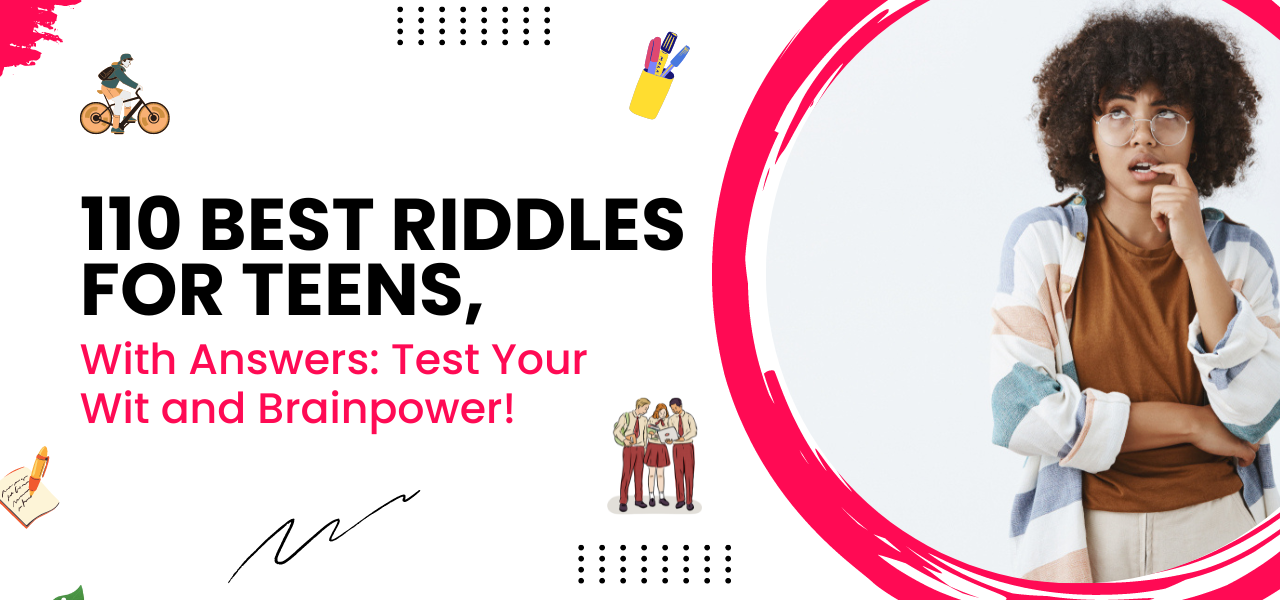110 Best Riddles For Teens, With Answers
Are you ready to embark on a journey of mind-bending puzzles and enigmatic conundrums? Get ready to flex your mental muscles with our handpicked selection of the 110 best riddles for teens! From tricky wordplay to logical puzzles, these riddles will keep you entertained and engaged for hours on end. So, gather your friends and family, and let the games begin!


What Are Riddles For Teens?
Riddles for teens are thought-provoking puzzles that require creative thinking, problem-solving skills, and a knack for lateral thinking. These riddles often contain clever wordplay, double meanings, and hidden clues that challenge the reader to think outside the box and come up with a unique solution. Perfect for teenagers looking to test their wit and brainpower, these riddles provide a fun and engaging way to exercise the mind and sharpen cognitive abilities.
Why Are Riddles For Teens Popular?
Riddles for teens have been popular for generations due to their ability to entertain, educate, and stimulate critical thinking skills. Teenagers are naturally curious and enjoy solving puzzles, making riddles an ideal form of entertainment for this age group. Additionally, riddles offer a break from the digital world and encourage face-to-face interaction, making them a great activity for social gatherings and family game nights.
How To Solve Riddles For Teens?
Solving riddles for teens requires a combination of logic, creativity, and lateral thinking. Start by carefully reading the riddle and identifying any keywords or clues that may help you decipher the answer. Next, consider multiple interpretations of the riddle and brainstorm different solutions. Don’t be afraid to think outside the box and explore unconventional ideas. Finally, trust your instincts and go with the answer that feels most logical and satisfying.
Benefits Of Solving Riddles For Teens:
- Critical Thinking Skills: Riddles challenge teenagers to think critically and analytically as they work to unravel complex puzzles and mysteries.
- Problem-Solving Abilities: By presenting unique challenges and obstacles, riddles help teens develop effective problem-solving strategies and techniques.
- Creativity and Imagination: Riddles encourage teenagers to think creatively and imaginatively as they explore different perspectives and interpretations.
- Enhanced Vocabulary: Many riddles contain clever wordplay and linguistic tricks, helping teenagers expand their vocabulary and language skills.
- Social Interaction: Solving riddles with friends and family fosters social interaction, communication, and teamwork, strengthening bonds and relationships.


110 Riddles For Teens
Quick, Devious Puzzles
- What comes once in a minute, twice in a moment, but never in a thousand years?
Answer: “M”
- What has keys but can’t open locks?
Answer: A piano
- The more you take, the more you leave behind. What am I?
Answer: Footsteps
- What has a neck but no head?
Answer: A bottle
- What has keys but can’t open doors?
Answer: A computer keyboard
- What has to be broken before you can use it?
Answer: An egg
- What has eyes but can’t see?
Answer: A potato
- What has a bed but never sleeps?
Answer: A river
- What belongs to you, but other people use it more than you do?
Answer: Your name
- What runs but never walks, murmurs but never talks, has a bed but never sleeps, and has a mouth but never eats?
Answer: A river
- In a car are two fathers and two boys. In the car, how many individuals are there?
Answer: Three individuals: a father, a son, and a grandfather
- In what context does divorce precede marriage?
Answer: According to the dictionary
- The wind is blowing from north to south, while an electric train is moving from east to west. Which way does the smoke flow?
Answer: Trains that run on electricity don’t smoke.
- You can’t hold it for longer than two minutes, even though it’s lighter than a feather. What’s that?
Answer: Breath of yours
- The more it dries, the wetter it gets.
Answer: A cloth towel
- What rises but never lowers?
Answer: Your years
- What must be given away before it can be kept?
Answer: A pledge
- What sharpens with increased use?
Answer: Your brain
- A pound of feathers or a pound of iron bars—which weighs more?
Answer: Both have the same weight.
- What has hundreds of letters between it, beginning and ending with the letters P and X?
Answer: A mailbox
- Which fruit is depressed all the time?
Answer: A blueberry
- Which tree is the easiest to hold in your hand?
Answer: A palm tree
- What lacks a body but has a head and tail?
Answer: A coin
- What lacks leaves and fruits but has branches?
Answer: A banking organization
- What lacks a body but has hands and a face?
Answer: A watch
- What can run, but has no legs, and a mouth, but cannot eat?
Answer: A river
- What lacks a start, stop, or middle?
Answer: A circle
- What’s brainless but has thirteen hearts?
Answer: A deck of cards
- What lacks a head but has a neck?
Answer: A bottle
- What do you cut and set out on the table, but never eat?
Answer: A deck of cards
Tough and Deceptive Puzzles
- You want to share me after you have me. However, you will lose me if you share me. Who am I?
Answer: A trade secret
- When you put two letters in something, does it get shorter?
Answer: The term “brief.”
- What kind of car is a palindrome?
Answer: A race car
- A farmer is approaching his field on foot. While traveling, he spots three frogs perched atop two rabbits’ shoulders. Four mice and three parrots sprint in his direction. How many leg pairs are moving in the direction of the field?
Answer: The farmer’s couple
- What similarities exist between your left hand and the formula “2 + 2 = 5”?
Answer: No, neither is accurate.
- I cannot be seen or bought by the one who uses me, nor can the person who buys me use it. Who am I?
Answer: A casket
- What travels the world yet remains stationary?
Answer: A postage stamp
- I have mountains devoid of land, towns devoid of inhabitants, and seas devoid of water. Who am I?
Answer: A map
- Though you cannot see me, you can hear me. Until you talk, I remain silent. Who am I?
Answer: A reverberation
- Which position are you in a race if you pass the person running in second place?
Answer: Secondly
- Which month has twenty-eight days?
Answer: Every month
- What do you destroy before using it?
Answer: An egg
- I have keys, but no doors. I have space but no rooms. You are not allowed to exit after entering. Who am I?
Answer: A keyboard
- You can hear me, but not see or feel me? Who am I?
Answer: Voice
- I live among trees, but I never go inside. I’m dead when I fall off a tree. Who am I?
Answer: A leaf
- Which fruit is the most romantic and sweetest?
Answer: Honeydew
- What is not alive but has fingers and a thumb?
Answer: A glove
- What contains holes but retains water?
Answer: In response, a sponge
- At the end of a line, what do you find?
Answer: The answer is “E.”
- I can’t shake your hands, even though I have hands. Even though I have a face, I can’t grin at you. Me? Who am I?
Answer: A clock
- A man constructs a home with its four walls pointing southward. A bear passes by the residence. What hue is the bear?
Answer: White, is the answer. It’s polar bear
- In a minute or an hour, but never in a day or a month, what can you find?
Answer: The letter “U”
- Although I am composed of water, I perish when you touch me. Me? Who am I?
Answer: Ice
- Give the name of three days in a row that aren’t the days of the week.
Answer: Earlier, now, and tomorrow.
- I am tall when I’m young. As I become older, I get shorter. Who am I?
Answer: A pencil or candle
- What enlarges the more you subtract from it?
Answer: A gap
- Is it possible for a man to go eight days without sleep?
Answer: He can sleep at night, yes.
- Which room lacks doors or windows?
Answer: A mushroom
- When its name is spoken, what breaks?
Answer: Silence
- I will survive even if you drop me on the ground. But I perish if you submerge me in water. Who am I?
Answer: Document
- I have a silky smooth texture. I’m not always soft. I stumble and can’t get back up. Who am I?
Answer: Rain
Funny Jokes
- What is the favorite term of an adolescent in math class?
Answer: “I can’t even,” was the response.
- What is the issue with an uncontrollably observant teacher?
Answer: He cannot control his pupils
- A man with a beard shaves throughout the day. How?
Answer: He works as a barber.
- What’s funny to an octopus?
Answer: Tentacles, or ten-tickles.
- Which month does the average person sleep the least?
Answer: February
- Alcohol makes me richer, but water kills me. Me? Who am I?
Answer: Fire
- Which window is impossible to open?
Answer: The windows on your laptop.
- What is an item of apparel that sounds like a war machine?
Answer: a tank top
- What did the math book tell to the pencil?
Answer: I have a lot of issues.
- What do you get when you combine silver, tungsten, and sulfur?
Answer: Swag
- When the irate electron was repulsed, what did it say?
Answer: Let me atom, please!
- What’s the old technology that lets people look through walls?
Answer: A window
- When should you switch on red and switch off green?
Answer: As you eat a watermelon
- How much space does an empty backpack have for books?
Answer: One, is the answer. After that, it is no longer vacant.
- What do you mean by the center of gravity?
Answer: The “V” letter
- What kind of music appeals to rabbits?
Answer: Hip Hop, that is!
- When the tide came in, what did the beach say?
Answer: A while, no sea
- What is read all over and in black and white?
Answer: A newspaper
- What sort of food do mothers consume?
Answer: Ties
Brainteasers
- Which word in English has three double letters in a row?
Answer: A bookkeeper
- Which letter (“uu”) is unique to the English alphabet?
Answer: Vacuum.
- Which word in English only has the letter “ii”?
Answer: Skiing
- Your one-story redwood home is where you currently reside. What shade are the stairs?
Answer: Which stairs, exactly? The house is one story.
- Not in ham, but in chocolate is my first letter. Cake and jam is where I rank second. I have my third in tea, not in coffee. All I am is a sleep-obsessed friend. Me? Who am I?
Answer: A cat
- Your friends ring the doorbell while you’re sleeping alone at home. They arrived in order to enjoy breakfast. You have a bottle of juice, a carton of milk, bread, jam, and cornflakes. What are you going to open first?
Answer: The eyes
- I am impossible to forget, hard to find, and hard to leave. Who am I?
Answer: A Companion
- Find the number, less than 100, whose digits are reversed to increase it by a fifth of its value.
Answer: 45 (1/5*45 = 9, 9+45 = 54) is the answer.
- What did the English book ask to the Algebra book?
Answer: Don’t change the subject.
- What thing has a bottom at the top?
Answer: Legs
Christmas Puzzles
- Does Santa know karate?
Answer: He does indeed own a black belt.
- What is the summertime name for a snowman?
Answer: A puddle
- What can pass through the top of the chimney but never the bottom?
Answer: An umbrella
- Is anyone ever truly hungry on Christmas?
Answer: A plump turkey
- What term do you use to describe someone who fears Santa Claus?
Answer: Shy
- On the day before Christmas, Adam said what?
Answer: This is Christmas, Eve.
- Which year was it that New Year’s and Christmas fell on the same day?
Answer: Each year
- What preserves the fresh scent of a Christmas tree?
Answer: Orna-mints
- Where is Thanksgiving before Christmas?
Answer: According to the dictionary
- What would the album name be if a lion had a Christmas music collection?
Answer: Jungle bells
- What is taught at elves’ schools?
Answer: The elfabet, in response
- To the Christmas stocking, what did the Christmas tree say?
Answer: Don’t you get tired of being by yourself all the time?
- Which reindeer is visible from space?
Answer: Comet
- Which reindeer has the fastest speed?
Answer: Dasher, in response
- Reindeer learn in what way?
Answer: They are elf-taught
- When Mrs. Claus peered up into the sky, what did she say to Santa?
Answer: I see some rain, dear.
- When the toys were mischievous, what did Santa say?
Answer: Toys are going to be toys.
- Which Christmas carol is your parent’s favorite?
Answer: Silent Night
- When Santa departs his house, which direction does he go in?
Answer: Santa resides in the North Pole, hence the answer is South.
- Can trees for Christmas knit well?
Answer. No, they continuously drop their needles.


FAQs on Riddles For Teens
Q: What are riddles for teens?
- A: Riddles for teens are brain teasers or puzzles designed to challenge teenagers’ critical thinking and problem-solving skills in a fun and engaging way.
Q: Are riddles suitable for all ages?
- A: Yes, riddles come in various difficulty levels, including some specifically tailored for teenagers. However, it’s essential to choose riddles that are age-appropriate and suitable for the teen’s level of comprehension.
Q: How can riddles benefit teenagers?
- A: Riddles can help teenagers improve their cognitive abilities, enhance their logical reasoning skills, boost creativity, and provide an entertaining way to learn new concepts or vocabulary.
Q: Where can I find riddles for teens?
- A: You can find riddles for teens in books, online websites, apps, and social media platforms dedicated to brain teasers and puzzles. Additionally, you can create your own riddles to share with friends and family.
Q: Can riddles be used for educational purposes?
- A: Yes, riddles can be an excellent educational tool for teenagers. They can be integrated into lesson plans to teach various subjects such as language arts, math, science, and critical thinking skills.
Q: Are there different types of riddles for teens?
- A: Yes, there are many types of riddles for teens, including logic puzzles, lateral thinking puzzles, math riddles, wordplay riddles, and visual puzzles. Each type offers a unique challenge and requires different problem-solving approaches.
Q: How can I solve a challenging riddle?
- A: To solve a challenging riddle, it’s essential to read the question carefully, analyze the clues provided, think outside the box, and consider multiple possible solutions before making a final guess.
Q: Are there any tips for creating your own riddles?
- A: Yes, when creating your own riddles, consider using wordplay, puns, rhymes, or clever twists to make them engaging and challenging. Start with a clear theme or concept and craft clues that gradually lead to the answer.
Q: Can riddles be used for social activities or icebreakers?
- A: Absolutely! Riddles can be a fantastic addition to social gatherings, parties, or team-building activities. They encourage interaction, spark conversation, and provide a lighthearted way to break the ice and get people talking.
Q: Are there any benefits to solving riddles as a group?
- A: Yes, solving riddles as a group encourages teamwork, communication, and collaboration among teenagers. It allows them to share ideas, brainstorm solutions collectively, and celebrate their successes together.
Conclusion:
In conclusion, riddles for teens offer a fun and engaging way to stimulate the mind, challenge the intellect, and foster creativity and imagination. Whether you’re looking for a brain-teasing solo activity or a lively group game, our collection of 110 best riddles for teenagers is sure to provide hours of entertainment and excitement. So, gather your friends, sharpen your pencils, and get ready to put your thinking caps on! Learn more parentology.co.



